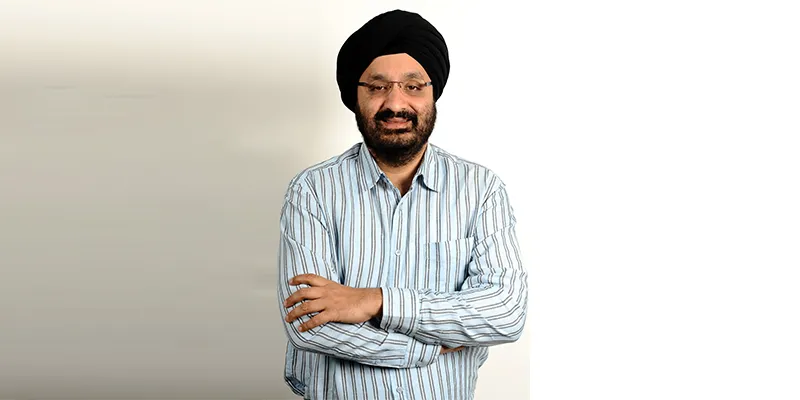From Microsoft to an angel investor: why Jaspreet Bindra believes Blockchain is the way forward
Jaspreet Bindra, digital transformation and future of work advisor, strongly believes that Blockchain can change the world. He tells YourStory why he's investing in Blockchain startups, and why Indian startups need to have a dual base.
At the sidelines of the Indian version of ThoughtWorks Live 2018 held in Bengaluru last week, YourStory got talking to Jaspreet Bindra, independent consultant and senior digital advisor to ThoughtWorks and Mahindra Group.
Ex-Microsoft Regional Director Jaspreet Bindra talked about his interest in Blockchain and deep tech, and how Indian startups can be at par with their global counterparts.

YourStory: Tell us about your experience in Microsoft.
Jaspreet Bindra: I was with Microsoft for approximately six and a half years and I did two things there. Initially they hired me to look after their internet business - MSN messenger. Although we grew by 5x, the x was very small.
Then I moved to the consumer and retail business, where I was mostly dealing with consumer products like Xbox and gaming; and consumer software like Windows Office and hardware. I was always on the consumer side in Microsoft, never on the enterprise side.
YS: What was your last venture with Mahindra all about?
JB: It's was a different job and role from anything that I have done in my life. It was about driving digital transformation, and Mahindra was one of the first few Indian corporates to embrace that idea. My job was educating people on digital transformation and its importance.
We worked with Mahindra Holidays and created a mobile app for them, which is a large part of their business today. We pioneered Blockchain in India in Mahindra. We built a great team and many of them are now the Chief Digital Officers in different Mahindra companies. Although I left Mahindra, my association with them still continues. I work with them as a Digital Transformation Advisor, like I am doing with ThoughtWorks.
YS: Tell us about your deep tech startup.
JB: I left my last job to do two things. One, to create a digital transformation advisory firm. I am advising companies like Mahindra and others on how they should digitally transform. On the side, along with a couple of young co-founders, I have started a company, which is building the future of workspace using Blockchain.
The 9-to-5 work of pyramids and organisational structure and every one sitting in the same place centrally is changing. Even products, software and tools will need to be very different from what they are today. We are trying to build products for the 'future of work'. We are using Blockchain because we believe that much like the future of workplace, Blockchain also is decentralised and is the right technology to build work tools. We are experimenting now; it will take us a few months to come out. We are a bootstrapped startup.
YS: You have been investing a lot in startups...?
JB: I used to. Right now, the only stratups I am investing in are my own. Previously, I have invested in Power2SME, Meesho, Thatspersonal, Wooprl, NowFloats, and StoryXpress.
Now I focus as an angel investor in non-crypto, Blockchain companies. I discovered Mumbai-based Elemential Labs long back and have been an advisor and very small investor in the company. They recently raised pre-Series A from Matrix Partners. I have also invested in Gurugram-based Blockchain company OnRamp.
YS: Any future plans on investments?
JB: Only mine. But if I find a very interesting Blockchain-based company, then yes.
YS: What are your criteria when you are investing?
JB: Initially when I started, I used to see where my friends are investing. Now, I have developed a preference. My criteria currently is very small teams doing deep tech work and focusing on non-crypto Blockchain. All the companies I have invested in are two to three-member companies.
YS: What's your opinion on deep tech in India?
JB: I like to think about deep tech as something you work on when you are trying to build certain infrastructure and technology, and not just building a customer base. Until recently, deep tech companies have not happened from India. The ones that did moved out to address global markets.
I still believe that Indian deep tech companies, whether in Blockchain or otherwise, should probably move base or have a dual base - in India and in another developed market. Early adoption of products will not happen in India.
I am not bullish about deep tech companies catering to the Indian market. You can have your founding team and tech team here, but you have to have an outpost elsewhere, in the Valley, Israel Canada, or Singapore, where the markets are.
YS: What do you think Indian startups should do to be at par with global competitors?
JS: It is not a problem of Indian startups but of the environment. The environment that propels a startup to become a big company, despite all efforts by startups, government or the industry, does not exist in India. The cost of work and inefficiencies are extremely high here.
I think the solution is having a dual footprint. India has a great supply of talent, sometimes even at lower costs, but the companies need to be somewhere outside of India to attract customers and investors.
YS: Any particular Indian startup that you think is doing a brilliant job in the tech segment?
JB: There are a bunch of AI startups are doing well. StoryXpress, Haptik and Elemential Labs are building stuff one would expect from the Valley or New York or London. OnRamp is also building something unique that very few companies across the world are doing.







